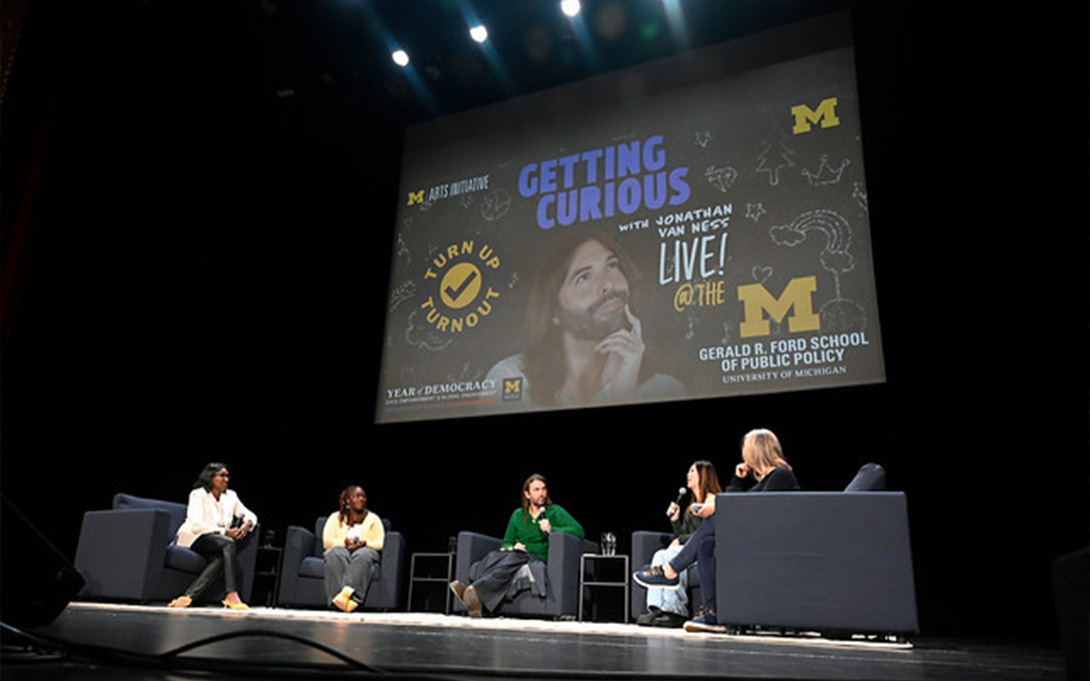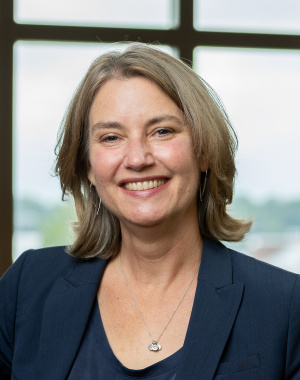
In 2004, Jonathan Van Ness was too young to vote, and “too busy watching the Golden Girls and missing class” to learn much about the presidential election. Now, they are engaging, and came to the University of Michigan to lead a conversation on the importance of voting and civic engagement.
The star of the TV show Queer Eye for the Straight Guy, brought their podcast, Getting Curious, to Ann Arbor for a live recording to discuss voting and civic engagement. They were joined in conversation by Ford School Dean Celeste Watkins-Hayes, Ford School Professor Jenna Bednar, who is the inaugural faculty director of campus-wide UMICH Votes and Democratic Engagement, and the two heads of the nonpartisan voter registration student group Turn Up Turnout, LSA juniors Maurielle Courtois and Hillary Poudeu Tchokothe.
You can hear the episode here.
Before the talk, given before an audience of 700 at the Michigan Theater, Van Ness toured the University of Michigan Museum of Art Hub for registration and absentee voting, an initiative in collaboration with the Stamps School of Art and design and the City of Ann Arbor Clerk’s Office.
For photos of the tour and the talk, see the Ford School Flickr account.
They discussed voter registration, the importance of getting involved, and the need to have a voting plan, among many other issues. Van Ness described civic engagement “as self care.”
The panel also discussed the political climate on college campuses and the nature of disagreement in the age of social media. Van Ness said they believe it is necessary to work with people in spite of different positions and to “correct lovingly”.
“Even if you do vehemently disagree with someone in their position, the world that you want to create that’s better, you ultimately are going to need each other for even if you really can’t stand someone’s views on something,” Van Ness said. “Giving the correction lovingly is so important in order for us to build the world that we want to build.”
Student organizers Courtois and Tchokothe said making a plan as soon as possible is the most effective way to ensure that your voting experience is easy and accessible. Courtois cautioned, “People who don’t have a plan to vote, they might have every intention, but day-of if something comes up, all of a sudden you have barely any time to fix it.”
Van Ness said their own trouble with the 2020 Texas absentee process “rigamarole” demonstrated to them first-hand the importance of being proactive when it comes to voting. They identified with students who might feel disillusioned with the democratic process, but nonetheless emphasized that each vote truly does make a difference, especially when it comes to local races, down-ballot measures, and the long-term impact of presidential administrations on institutions like the Supreme Court: “There is actual data and evidence to suggest that elections can be decided by that thin of a margin, so your voice really is so incredibly important.”
Watkins-Hayes argued that voting on campus is particularly special, because it represents a time when students are actively forming their political consciousnesses and developing lifelong civic habits. She said that students are casting their first ballots “at the very moment when you’re coming into adulthood, and thinking, ‘where is this world going to be when I’m trying to live my life, start a job, start a family, run for office…. take over the world?’” She continued, “This is an incubator for people as they’re developing their political voice, their political imagination, their political consciousness.”
For Van Ness, the call to activism and civic engagement on behalf of LGBTQIA+ rights was also deeply personal. After being diagnosed with HIV 12 years ago, they raised their voice because they felt that no one else should ever have to experience the same difficulties that they did while trying to get information, access medication, and navigate health insurance coverage. They argued that everyone has a responsibility to use their own platform to become an advocate for the issues they care about. No matter who you are or how you identify, they said, “When we’re showing up for each other we’re showing up for ourselves.”

